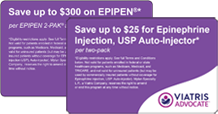
Honeybees, yellow jackets and stinging ants…oh my!
Most people stung or bitten by an insect may experience swelling, pain and redness that may persist for up to a week and usually gets better without treatment. However, some individuals can develop a potentially life-threatening (severe) allergy to insect stings or bites—even after being stung or bitten several times before without a problem.
If you have a stinging or biting insect allergy, consider taking these precautions:
- When you go outside, avoid wearing brightly colored clothing or using sweet-smelling lotions, perfumes and shampoos
- Always wear shoes
- If you’re eating, keep your food and trash tightly sealed
- If your activity might expose you to insects or their nests (gardening or hiking, for instance), wear pants and long-sleeved shirts
Avoid what you can.
Although you try, not all stings and bites can be avoided, so those with potentially life-threatening allergies to bee venom, wasp venom or fire ant venom should have access to two epinephrine auto-injectors, such as EPIPEN® (epinephrine injection, USP) Auto-Injector or its authorized generic, particularly when outdoors.
Treating insect allergies
People with insect allergies can be treated with standardized insect injections (immunotherapy), which may provide long-term protection against insect stings. However, not everyone treated this way remains tolerant to insect stings or bites for life. You may still need to carry EPIPEN 2-PAK® or EPIPEN JR 2-PAK® (or their authorized generics).
In case of anaphylaxis triggered by insect bites or stings, administer EPIPEN or EPIPEN JR® (epinephrine injection, USP) Auto-Injector or their authorized generics immediately and seek emergency medical care.
Share This Site
Explore
Explore the latest savings offers for EPIPEN (epinephrine injection, USP) Auto-Injectors and the Authorized Generic for EPIPEN See Terms and Conditions
Antihistamines are not recommended for the life-threatening symptoms of anaphylaxis.
heading
INDICATIONS (the following information applies to both EPIPEN and its Authorized Generic)
EPIPEN® and EPIPEN JR® Auto-Injectors are used to treat life-threatening, allergic emergencies in people who are at risk for or have a history of serious allergic emergencies. EPIPEN and EPIPEN JR are for immediate administration by you or your caregiver. They do not take the place of emergency medical care. You should get emergency help right away after using your EPIPEN of EPIPEN JR.

Patient Information
Please select from the following:

Prescribing Information
Please select from the following:



